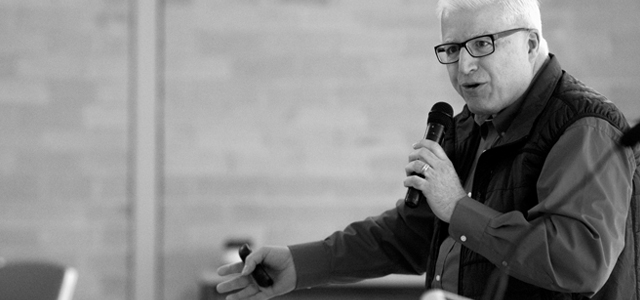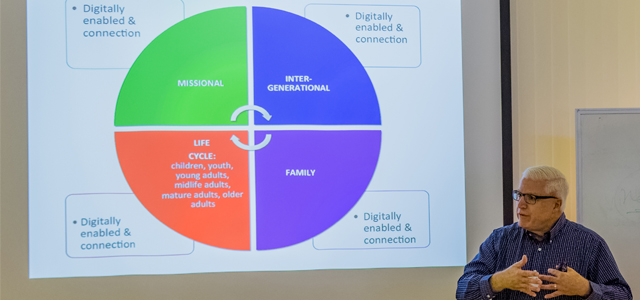“It is the culture of the whole church that is most influential in nurturing a vital Christian faith.” International speaker John Roberto was in Sydney recently for two key events, exploring what lifelong faith formation might look like in a multi-faith, culturally diverse, digital-enabled world.
A leading educator from American organisation Lifelong Faith, Roberto spoke from US research about such timely topics as what makes Congregations effective in ministry with young people. A recent Effective Youth Ministry study revealed that churches who were strong in youth ministry were, in fact, healthy faith communities for all ages.
Mr Roberto is a highly sought-after specialist in assisting churches to use their communities to grow thriving faith communities. He is president of Lifelong Faith Associates, editor of the journal Lifelong Faith, and works as a consultant to churches and global organisations. He teaches courses and conducts workshops in faith formation, and has authored books and program manuals on faith formation for all ages.
From a range of churches in Australia and New Zealand, 60 people gathered for a three-day teaching intensive. This was followed by a national conference that included a range of speakers and workshops on formation and mission, in a digital age.
Discussing intergenerational faith
During the conference, Insights sat with John Roberto to discuss faith – importantly, the intergenerational kind — in a digital world, and how age is no barrier to faith formation.
“People are looking for a way to grow their ministries, but also deal with the realities of their Church culture,” said Mr Roberto. “I think [Churches] see that intergenerational faith formation as the key character of community, so it’s not how much you do; it’s that you weave it through everything you do in community life. No matter how small you are, intergenerationality is really a strength.
“If you are a smaller Congregation, you can build on that. It is actually an asset.
“We live in a very fragmented society. It is about reflecting on who we are and becoming more intentional and looking for every opportunity to connect each other and generations.”
This begs the questions: How do we bridge from what we would like to accomplish — in terms of discipleship and faith formation — and make it real? And what’s the bridge to do this in terms of knowledge and skills?
Different strategies to connect
During the conference, Mr Roberto invited participants to think about different audiences and settings for faith formation. Much of our faith-forming activity is aimed at the faithful core attenders of the church. But we need different strategies to connect with occasional attenders, with those in the community who see themselves as “spiritual but not religious”, and with those who currently have no interest in either spirituality or religion.
“We should absolutely take the digital world seriously,” said Roberto of formation in a digital world. “500 years ago, we took the printing press seriously. 500 years ago, it was a brand new innovation and so what the printing press did was bring literacy to Europe and the world. But it also brought the Bible into people’s homes. It was a revolution that democratised learning in the church as well as society. We used the printing press to educate and to teach. So now we stand in 2016 and so, now, the printing press is the internet. It’s all the new digital tools and media that is available to us.”
“So when churches say, ‘We’re not sure about that’, they said the same thing about the printing press.
“We have this great opportunity presented to us. We have these great digital tools and technologies available for most of us, almost free. We have great, high-quality religious content, produced by individuals, publishing companies and religious denominations all available to us.
“We have this gap where churches need to adopt these tools to communicate the gospel. Not because it’s a fad, not because it’s the thing we should do, but because this is the way the gospel is going to be communicated. So we now have this unprecedented opportunity to literally reach everyone in our community with digital media.
“We have an opportunity to expand our church campus into people’s everyday life so that – during Lent, for example – every day during Lent we can be in relationship with people, whether they are active in our community or whether they have nothing to do with our community. Each day we can use tools like Facebook to interact with people around faith questions.”
Wisdom informs the faith of others
An opportunity that exists for faith formation that Mr Roberto often refers to is the “low hanging fruit” in Congregations – it is the vast wisdom of older generations and how they can mentor young people and bridge the “family and generation gap” as grandparents, to children and young people in their Congregations.
“Grandparents have lived and practiced their faith for decades,” continues Mr Roberto. “They are the best delegates back to the family. You have a lot of religious diversity among the parent generation and we don’t have that same diversity among the grandparent generation. So [some] churches have said, ‘We’ve got grandparents; let’s nurture and equip them to speak to the younger generation.’”
While information tells us that church life is in decline, Roberto see this as something of a strength. Grandparents have a greater opportunity to reach grandchildren than church staff would, because they are in relationship already.
“I think ministry leader’s role is emerging as a blend of physical programming with managing of resources — not just digital resources but people resources, on behalf of their community. They are going to have to adopt new roles. There is such an abundance of resources and such a diversity of people and needs, that if they don’t get other people working with them on this, it will be very difficult. You have to invest in your people to find and evaluate great content for programs, for both adult and children’s faith formation.”
The faith formation process is informed by the vast amount of material at our fingertips everyday. Ministry agents also shouldn’t be shy about using their best assets – families – to find these helpful and varied resources.
“Parents are gatekeeping resources all the time. What if we taught them how to look for great faith formation resources?” asks Roberto. “Churches need to move away from the days of just purchasing a curriculum, to actually curating and discovering great resources. We used to purchase our solutions; now, we have to curate our solutions.”
John Roberto invites churches to think differently about how faith formation might take place in their communities: intergenerationally; in family settings; through digital communication; through the caring relationships; by celebrating the liturgical seasons, rituals and milestones; reading the Bible together; and, as a family, learning the Christian tradition and applying it to life through prayer, devotions and spiritual formation.
As Mr Roberto says, “It’s a team effort,” because if we all invest in the future of the church, that will have immeasurable Kingdom value.”
Adrian Drayton
Presentations
Access John Roberto’s resources from the Conference:














